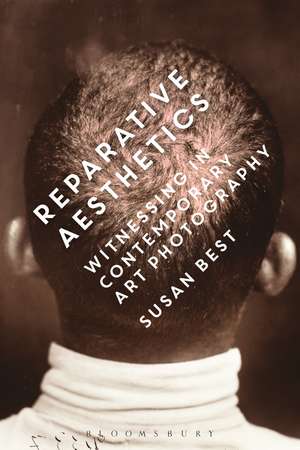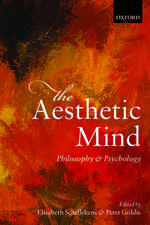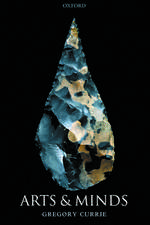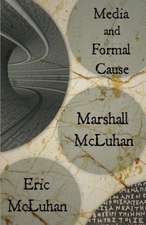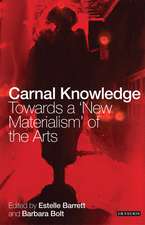Reparative Aesthetics: Witnessing in Contemporary Art Photography
Autor Susan Besten Limba Engleză Hardback – 19 oct 2016
| Toate formatele și edițiile | Preț | Express |
|---|---|---|
| Paperback (1) | 179.98 lei 3-5 săpt. | |
| Bloomsbury Publishing – 19 oct 2016 | 179.98 lei 3-5 săpt. | |
| Hardback (1) | 568.40 lei 6-8 săpt. | |
| Bloomsbury Publishing – 19 oct 2016 | 568.40 lei 6-8 săpt. |
Preț: 568.40 lei
Preț vechi: 726.22 lei
-22% Nou
Puncte Express: 853
Preț estimativ în valută:
108.77€ • 116.31$ • 90.68£
108.77€ • 116.31$ • 90.68£
Carte tipărită la comandă
Livrare economică 17 aprilie-01 mai
Preluare comenzi: 021 569.72.76
Specificații
ISBN-13: 9781472529787
ISBN-10: 1472529782
Pagini: 232
Ilustrații: 52 bw illus
Dimensiuni: 156 x 234 x 14 mm
Greutate: 0.48 kg
Editura: Bloomsbury Publishing
Colecția Bloomsbury Academic
Locul publicării:London, United Kingdom
ISBN-10: 1472529782
Pagini: 232
Ilustrații: 52 bw illus
Dimensiuni: 156 x 234 x 14 mm
Greutate: 0.48 kg
Editura: Bloomsbury Publishing
Colecția Bloomsbury Academic
Locul publicării:London, United Kingdom
Caracteristici
An award-winning, internationally recognised author who is an expert in contemporary aesthetics
Notă biografică
Susan Best is Professor of Fine Art and Art Theory at Queensland College of Art, Griffith University, Australia. Recent publications include Visualizing Feeling: Affect and the Feminine Avant-garde (2011) which won the Art Association of Australia and New Zealand best book award in 2012.
Cuprins
List of IllustrationsAcknowledgementsIntroductionChapter 1 Guilt and Shame: Current Debates in Affect Studies Chapter 2 Witnessing Fever Chapter 3 Shame and the Convict Stain: Anne Ferran's Lost to Worlds Chapter 4 Fiona Pardington: Colonialism and Repair in the Southern Seas Chapter 5 Rosângela Rennó: "Little Stories of the Downtrodden and the Vanquished" Chapter 6 Our dark side: Milagros de la Torre's The Lost Steps ConclusionNotesBibliographyIndex
Recenzii
This book begins with an extraordinary hypothesis: that art can function to mark, to remember and to heal social personal and collective shame. Rather than personal or historical expression, art can act as a form of reparative memory of what cannot be otherwise adequately represented. Reparative Aesthetics develops a new account of what photographic art by women artists from the global south is able to accomplish through the acknowledgement and exposure of shame. Beautifully and hauntingly written, this book reminds us that art expresses what cannot be said.
Susan Best's work trail blazes a compelling narrative through art and psychoanalysis, revealing how the work of four women artists who 'look closely at our dark side' inform contemporary debates on the politics of trauma and repair.
Susan Best's book is in itself reparative. Rather than following the standard position and staking a claim for one form of interpretation, she elegantly draws together lines of thought, debate and art practice. Focusing on women artists from the southern hemisphere who use photography to manifest the complexities of history, Best, with great subtly and erudition, builds on their practice rather than using it as illustration. This book has important application to cultural production from all parts of the world and releases viewer, thinker and artist from much of the endism which has consumed art theory over past decades.
Effecting her own reparation between affect theories and psychoanalysis, Susan Best gives us an impressive account of shame, guilt and witnessing in the work of four women photographers. Reparative Aesthetics is eloquent and persuasive, meticulous and critically astute; moving its reader beyond the impasses of identity politics, it enables us to look anew at how difficult and distressing national histories are being transformed. A deeply engaging book that confirms Susan Best's credentials as a discerning and skilled analyst of affect, art and politics.
Susan Best's work trail blazes a compelling narrative through art and psychoanalysis, revealing how the work of four women artists who 'look closely at our dark side' inform contemporary debates on the politics of trauma and repair.
Susan Best's book is in itself reparative. Rather than following the standard position and staking a claim for one form of interpretation, she elegantly draws together lines of thought, debate and art practice. Focusing on women artists from the southern hemisphere who use photography to manifest the complexities of history, Best, with great subtly and erudition, builds on their practice rather than using it as illustration. This book has important application to cultural production from all parts of the world and releases viewer, thinker and artist from much of the endism which has consumed art theory over past decades.
Effecting her own reparation between affect theories and psychoanalysis, Susan Best gives us an impressive account of shame, guilt and witnessing in the work of four women photographers. Reparative Aesthetics is eloquent and persuasive, meticulous and critically astute; moving its reader beyond the impasses of identity politics, it enables us to look anew at how difficult and distressing national histories are being transformed. A deeply engaging book that confirms Susan Best's credentials as a discerning and skilled analyst of affect, art and politics.
